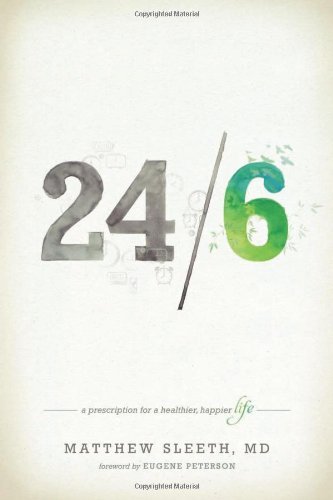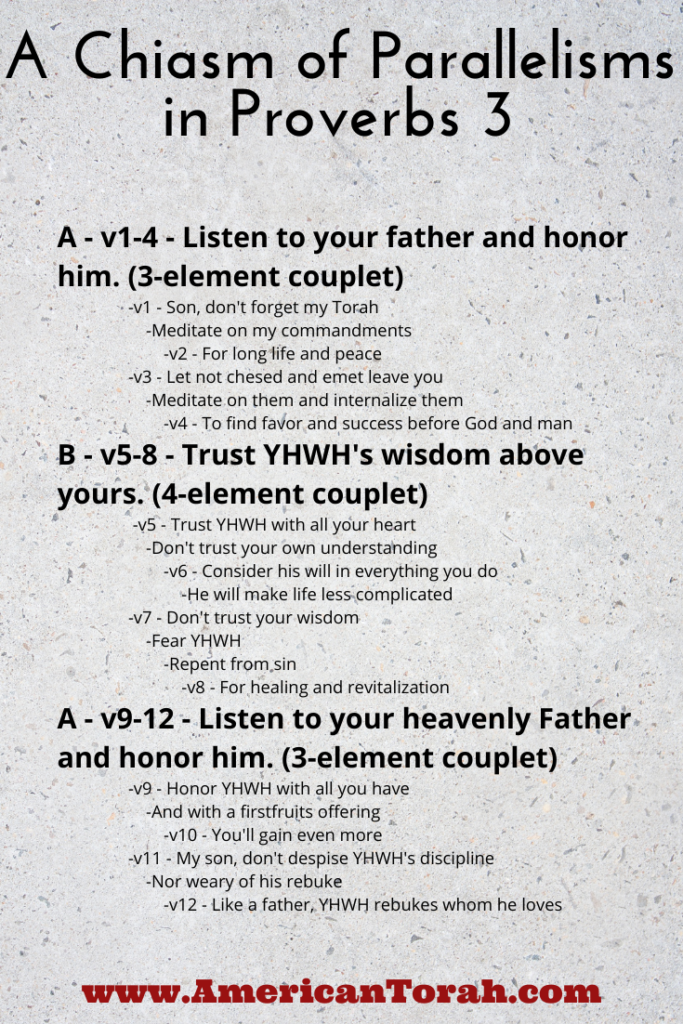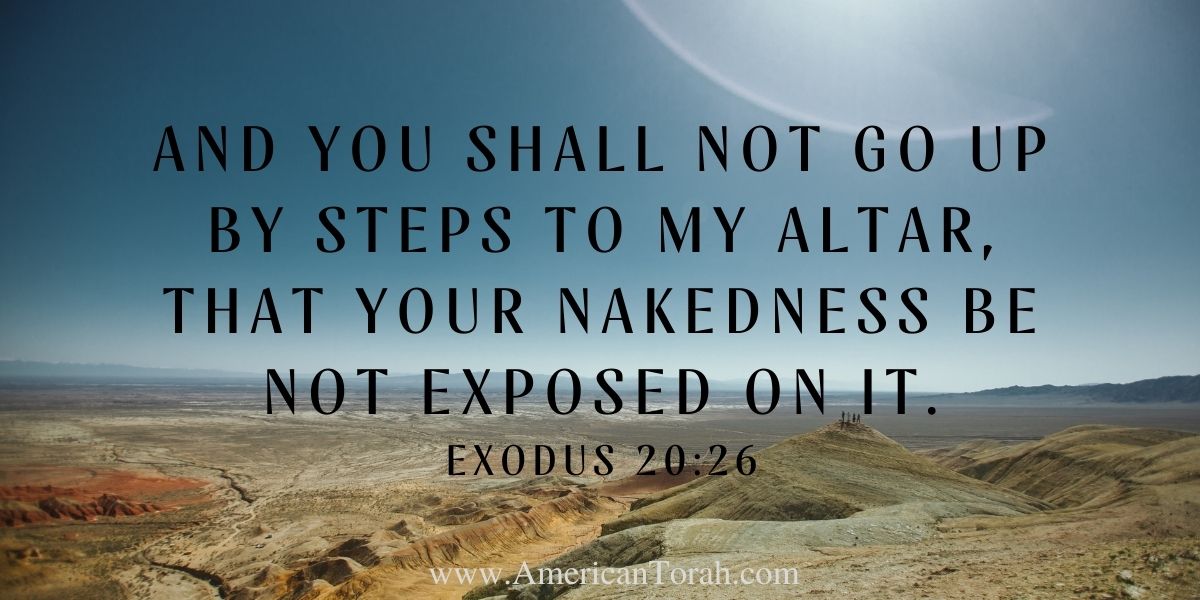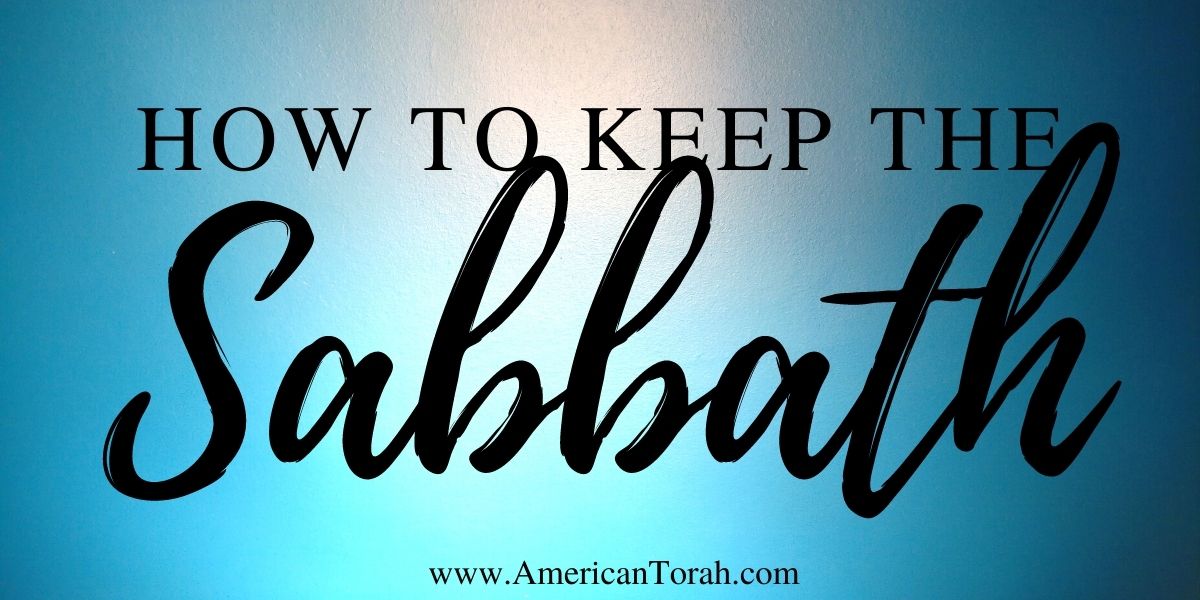Remember the Sabbath day, to keep it holy. Six days you shall labor, and do all your work, but the seventh day is a Sabbath to the LORD your God. On it you shall not do any work, you, or your son, or your daughter, your male servant, or your female servant, or your livestock, or the sojourner who is within your gates. For in six days the LORD made heaven and earth, the sea, and all that is in them, and rested on the seventh day. Therefore the LORD blessed the Sabbath day and made it holy.
Exodus 20:8-11
God had a lot to say about the Sabbath in the Bible, and I don’t think God wastes words. If we take the Bible seriously, we can’t deny that the Sabbath is important. He said “Do it because I did it. Do it because it’s a sign of the covenant between you and Me. Do it because you were a slave and those who work for you deserve a day off too. Do it because it honors me. Do it because it’s my day, and I want you to.”
Work six days. Take the seventh day off. That sounds easy enough. It’s a single day of rest each week, from sunset on Friday until sunset on Saturday. How hard can that be?
Pretty hard, as it turns out.
We thank God for Fridays as we leave the office on the last work day of the week. We kick back, spend some time with family and friends, maybe watch a little television…and then we go back to work on Saturday morning.
That grass won’t cut itself, after all. The car won’t fix itself. The windows need washing, the bills need paying, and you’ve got a pile of papers leftover from the office to sort through. Who’s got time to take a day off?
You do.
In fact, you can’t afford not to take the seventh day off, and let me tell you why.
The Sabbath belongs to God, and he commanded us to keep it. However, Yeshua said that the Sabbath was made for us. Does God need to rest? Probably not, yet he rested on the seventh day of creation as an example for us. Like sleep, friendship, and love, rest from labor is an essential ingredient to human fulfillment.
Seven is the number of completion, and we can’t be complete without the seventh day Sabbath. We can never fully realize all of the good that God has for us without it.
Earlier, I wrote about how we can know that the day we call “Saturday” now, the seventh day of the week, is the real Sabbath. Once you see the facts laid out, that part’s not so difficult. Keeping the Sabbath the way God intended is something else entirely.
Part 1: Why is it so hard to keep the Sabbath?
I think there are three reasons it can be hard to keep the weekly Sabbath.
First, some people just hate God and everything he does. They want to do everything God said not to do, and nothing that he commanded. If you’ve read this far, you’re probably not one of them, so I’m not going to spend any more time on that.
Second, it really is difficult to break the momentum of life. Everything has to change on this one day. Did you drive a truck all week? Crunch numbers? Make nice with frustrated retail customers? Full stop. On the Sabbath you don’t do that. That kind of shift requires deliberate effort and some major habit changes.
I’m probably not the best person to help you make a change in mindset or habits, but there are many out there who are expert at it. A supportive family and community will probably be more helpful to you in this respect than anything else.
Third, most people simply don’t know how to keep the Sabbath. There are bad teachers and false teachers. There are things we’ve heard and things we’re just “sure” the Bible says, but can’t remember where.
What does it mean not to do any work? What about cooking? Maybe you’ve heard that you’re not supposed to turn a light switch on. What if you’re on call or you work in a hospital? Isn’t this all just for the Jews anyway?
Should We Just Keep the Sabbath Like the Jews Do?
There are a lot of traditions about how to keep the Sabbath. The rabbis have spent thousands of years accumulating rules about what you can’t do and how much of what you are allowed. Even in Yeshua’s day, the multitude of rules had become overbearing. An Orthodox Jewish rabbi can spend years studying the laws of Shabbat, and still not learn everything there is to know about it.
It seems to me that if your day of rest is more burdensome than a regular work day, you must be doing something wrong.
I don’t mean to totally dismiss rabbinical learning regarding the Sabbath. They are the heirs of more than 3000 years of learning, practice, and tradition regarding God’s Law. While I believe they have gone overboard in many respects, they have put an enormous amount of consideration into the matter, and their teaching is often profound in its depth and elegance. It shouldn’t be dismissed lightly.
But it’s easy to get lost in the complexity and to lose the distinction between commandment and tradition, and some of it really is just nuts. We have families, communities, and businesses to run. Very few of us have years to invest in mastering a set of religious rules whose connection to God’s commandments is tenuous.
Ninety percent of tradition regarding the Sabbath probably isn’t relevant to your life and a significant portion of the rest is nonsense. I don’t want you to give up because you the essential truth is buried beneath centuries of extraneous tradition.
How Are We Supposed to Keep the Sabbath?
In preparing for this article, I searched the scriptures for every reference to the Sabbath and did my best to distill it all down to what really matters. Unfortunately, I am going to have to discuss some do’s and don’t’s. God was very clear that some things aren’t allowed and that some other things are required. There’s no way around that.
I have organized the Biblical Sabbath injunctions into three categories:
- Positive commandments: Are we supposed to go to church? Take the day off? Sit silently all day?
- Negative commandments: What constitutes work? Are we allowed to cook? Use a computer? Light a fire?
- Gray areas: Is it OK to drive to church or synagogue? What if we’re away from home and we’re hungry? What about people who have to work on Saturdays?
That third category is necessary because God doesn’t spell everything out for us. He expects us to think carefully about his Law and to work out the ambiguities in our communities, families, and consciences. I believe that’s part of his plan for building character in his people. I’ll try to point you in the right direction, but you’re going to have to make some decisions for yourself.
Part 2: The Positive Commandments
When we think about the weekly Sabbath, we usually think about what we are not allowed to do: don’t work, don’t kindle fires, don’t buy and sell, etc., but God also had a lot to say about what we are required to do on the Sabbath.
In this email, I have listed the positive Sabbath commandments with scriptural references for each, as well as discussing what each one means for us today.
Keep the Sabbath holy
(Genesis 2:2-3; Exodus 20:8, 31:14, 35:2; Deuteronomy 5:12; Isaiah 56:2, 58:13-14; Jeremiah 17:19-27; Ezekiel 20:11-24, 22:8, 23:38, 44:24-25, 46:1-3)
God said to “keep my Sabbath’s holy” so many times that its importance to him cannot be overstated. We must keep the weekly Sabbath separate (the literal meaning of “holy”) from other days.
Paul’s discussion about days in Romans 14:5-6 is about whether it’s better to fast on one day or another, and not about keeping the Sabbath. Likewise, his discussion of holidays in Colossians 2:16 is about man-made rules, not about God’s commandments.
The Sabbath is sacred, and no one is authorized to change that. It must be kept sacred primarily by two methods.
First, we sanctify the Sabbath by very deliberately moving the focus of our attention away from our own needs and labors to the needs of God and, by extension to the needs of his creatures, especially those who were also made in his image. We stop thinking about paying bills and making deals, and instead we think about our relationship with our Creator, as well as with our neighbors.
Second, we follow God’s instructions as outlined in the rest of this article. On every other day of the week, we may work, play, and conduct our lives in almost any manner we choose, but this day is different. On the Sabbath, we stop doing all of those other things, and instead we study the Scriptures, pray, fellowship, and ease one another’s burdens.
Keep the Sabbath for God’s sake
(Leviticus 19:30, 26:2; Numbers 15:30-36; Nehemiah 9:14; Isaiah 58:13-14, 66:23; Ezekiel 20:11-24, 23:38)
The Sabbath was made for man (Matthew 12:11-3; Mark 2:27-28; Luke 6:5), but that doesn’t mean God gets no benefit from it. Like any good parent, he wants us to do those things which are best for us, and he wants to have a close relationship with us. The Sabbath enhances both. It’s important to God that we keep it, therefore we keep it not only for our sake, but for his.
Assemble on the Sabbath
(Leviticus 23:1-3)
There is only one explicit command to assemble on the Sabbath, and it is a general command for all of God’s appointed times:
The LORD spoke to Moses, saying, Speak to the people of Israel and say to them, These are the appointed feasts of the LORD that you shall proclaim as holy convocations; they are my appointed feasts. Six days shall work be done, but on the seventh day is a Sabbath of solemn rest, a holy convocation. You shall do no work. It is a Sabbath to the LORD in all your dwelling places…
Leviticus 23:1-3
Although this instruction is only given once, it is exemplified by the actions of the prophets and apostles throughout Scripture, and by related prophecies in Isaiah and Ezekiel.
In Isaiah 66:23 and Ezekiel 46:1-3, God said that all people and the people of Israel, respectively, will one day gather to worship him on the days of the new moon and the weekly Sabbath.
In 2 Kings 4:23, a conversation between a woman and her husband hints that it was common practice to gather for teaching on the weekly Sabbath, and 2 Kings 16:18 talks about a covered walkway constructed at the Temple for the king’s private use on the Sabbath, indicating that the weekly gatherings were important enough that the king made a point of attending.
Yeshua made a lifelong habit of attending the local synagogue for Torah readings and teachings every Sabbath. (See Matthew 12:9; Mark 1:21, 3:1, 6:2; Luke 4:16-30, 4:31-37, 6:6-10, 13:10.) Paul also attended synagogue every Sabbath. (See Acts 13, 15:21, 16:13, 17:1-3, 18:4.)
There’s nothing wrong with gathering for worship on any other day of the week, so long as we don’t neglect gathering on the seventh day Sabbath.
Relieve suffering
There is no direct command to relieve the suffering of others on the Sabbath, but there are commands to relieve the suffering of others in general. Most notably, Leviticus 19:18 says to “love your neighbor as yourself”, and this obligation doesn’t stop on the Sabbath. This was a continual point of conflict between Yeshua and the Jewish religious experts of his day.
When the Master and his disciples were passing through a grain field, the disciples plucked heads of grain and ate as they walked. Not only did Yeshua not rebuke them, but he defended their actions. They weren’t harvesting by any normal standards. They had no blades or bags. It can’t even be said that they were gleaning as the poor were allowed to do behind the regular harvesters. They were homeless and hungry, so they ate. To refuse them would have been needlessly harsh and would have created the added burden of hunger to their journey. (See Matthew 12:1-8, Mark 2:23-28, Luke 6:1-5.)
On numerous other occasions, Yeshua made a point of healing the sick, handicapped, and oppressed on the Sabbath. Although the Pharisees and Sadducees objected, he pointed out that they rightly have no objection to performing circumcisions on the Sabbath, and none of them would hesitate to rescue an animal from a ditch on the Sabbath. How much greater is it to relieve the sick from their oppressive burdens? Healing is not only allowed on the Sabbath, it is an even greater good than otherwise, as it allows more people to rest and no payment can be asked in return. (See Matthew 12:9-14; Mark 1:23-28, 1:30-31, 3:2-5; Luke 4:31-39, 6:6-10, 13:10-17, 14:1-6; John 5:1-17, 7:22-24, 9:1-16.)
Perform essential Temple & Covenantal duties
(Leviticus 24:1-9; Numbers 28:9-10; 2 Kings 11:5-9; 1 Chronicles 9:32, 23:31; 2 Chronicles 2:4, 8:12-13, 23:1-11, 31:2-3; Ezekiel 46:1-3; Matthew 12:5-6; John 7:21-24)
There is no Temple, so the instructions for Sabbath sacrifices don’t apply to us directly, but we can learn from them by example. The essential functions of the Temple and Covenant included sacrifices, replacing the Bread of the Presence, performing circumcisions, and rotating the contingents of guards and priests on duty. The common factor among all of these activities is ensuring the ability of other people to keep the Sabbath.
Equivalent activities today (and probably in the first century as well) include preparing our meeting places, providing security in various ways, conducting religious services, etc. All of these things can involve burdensome labor, but they must be done to some extent if people are to be able to gather for worship as the commandments require.
Note that the guards and priests serving at the Temple were rotated from one week to the next. This ensured that nobody would have to work every Sabbath, and I think that’s a good practice to follow whenever possible, especially if you are in a position to set schedules for other people. Also remember that a good leader doesn’t require his people to do what he is unwilling to do himself. If you must assign others to work on the Sabbath for some reason, you should put yourself in the rotation with them.
Keep even essential work on the Sabbath to a minimum and spread the load whenever possible.
Rest
(Exodus 31:15, 34:21, 35:2; Leviticus 23:3; Luke 23:56)
Six days you shall work, but on the seventh day you shall rest. In plowing time and in harvest you shall rest.
Exodus 34:21
The Hebrew for “rest” in this and other verses about the Sabbath is “Shabat”, which, according to Brown-Driver-Briggs literally means to stop. It means that, whatever you normally do to earn your living on other days, you will stop doing it on this day. The added “in plowing and harvest” means that considerations of business or harvest conditions are irrelevant. It doesn’t matter to God whether Saturday is your busiest, most lucrative day of the week. He said to stop and rest. Even if it is the first day in weeks that the fields have been dry enough to plow or harvest, you will rest on the Sabbath rather than work. Sometimes God sends a break in the storm so that you will have a greater opportunity to exercise your faith in him.
You will take a day off from work. You will relax. You will contemplate the goodness of God manifested through his Creation, rather than working to tame or manipulate the Creation through your own efforts.
The Sabbath is not a day to prepare for your old age or to worry about bills and groceries. It takes an effort to set those things aside, but this is a command of God. You will enjoy what he has given you, no matter how great or meager, and you will spend time in his presence, trusting in his Providence rather than worrying about your own.
A Positive Sabbath
As you can see, the Sabbath is intended to be a positive experience, an opportunity to refresh ourselves and our relationships with God and our community. While the shift in habits and attitude can be difficult, it isn’t a burden. In the long run, the Sabbath enhances our lives not only by taking away our labors, but by adding gratitude and joy.
The Sabbath was made for man, after all, not man for the Sabbath.
Part 3: The Negative Commandments
Sabbath Day taboos were a frequent point of conflict between Yeshua and the Jewish religious leaders of the first century. The Sadducees and Pharisees placed severe restrictions on what a person could and couldn’t do on the weekly Sabbath, what he could carry, how far he could walk, etc. Yeshua, on the other hand, said that these rules were themselves a violation of the Sabbath because of the heavy burden they placed on people.
The Judeo-Christian world has fragmented since then into a thousand different interpretations of the Sabbath, how to keep it, and whether we ought to keep it at all. One person will refuse to work at his job, but he will pay someone else to work at theirs. One person goes to church, while another won’t leave his house. One person won’t push a button or turn on a light, while another person says the Sabbath is obsolete and we should treat all days exactly alike.
The Jewish rabbis have continued to add volumes of restrictions to Sabbath, so many in fact, that they long ago had to organize them into thirty-nine types which can be grouped under six general headings: field work, making cloth curtains, making leather curtains, making the beams of the Tabernacle, assembling and disassembling the Tabernacle, and inaugurating the Tabernacle.
Why do curtains get two headings? And how does carrying a bed roll or long distance walking fit into this scheme?
Despite initial appearances, those six categories do make a sort of sense when you examine the reasoning behind them, but in my opinion, they have over-thought the issue into absurdity. If you ever find yourself seriously wondering whether pushing a wheelchair through a patch of dirt might be a violation of the Sabbath because the resulting ruts look suspiciously like furrows plowed in a field…then I think you have missed the point of the Sabbath.
I don’t believe that God has canceled the Sabbath that he instituted in the very first week of Creation, but I also believe that it shouldn’t be so complicated to keep that a person can spend months or years mastering the details. God gave us a day off from our concerns, not a day of agonizing over the minutia of daily life.
Unfortunately, since there is widespread disagreement over what is and is not acceptable on the Sabbath, we still have to talk about it. Most importantly, we must continually return to the Scriptures, God’s instruction manual for life, to remind ourselves what God actually said.
In preparing for this series, I compiled a list of Sabbath-related scriptures, which you can view here: Bible Passages about the Weekly Sabbath. I encourage you to read and study them yourself, and if you find that I am missing anything, please let me know in the comments on that blog post.
Rather than dividing up the negative commandments of Sabbath into thirty-nine categories or even six, I think they can be reduced to seven simple restrictions and summarized in two statements. I am confident that every capable adult can understand these rules and interpret them for their own lives and circumstances.
Let’s take the seven restrictions first.
The Sabbath’s Seven Restrictions
1. Do not gather manna
…Moses said, “Eat it today, for today is a Sabbath to the LORD; today you will not find it in the field. Six days you shall gather it, but on the seventh day, which is a Sabbath, there will be none….The LORD has given you the Sabbath; therefore on the sixth day he gives you bread for two days. Remain each of you in his place; let no one go out of his place on the seventh day.” So the people rested on the seventh day.
Exodus 16:1-30
When God gave the Hebrews manna in the Wilderness, he instructed them to gather it for six days only, gathering twice as much on the sixth day, and none at all on the seventh. If anyone gathered extra on the other days, it rotted before morning, but the extra manna gathered on the sixth day would remain fresh and edible through the seventh. No manna fell at all on the seventh day, so anyone who disobeyed and went out to gather manna on the Sabbath came back empty-handed. Anyone who didn’t gather extra on the sixth day because they expected it to rot before morning as on other days would go hungry on the seventh.
The manna stopped when Israel entered the Promised Land, so this command no longer applies to us directly, but God was teaching eternal principles to them that we can still learn from in any age. The main principle is this: Obey God even when it doesn’t make sense. God does not make arbitrary rules. Every single statute and precept was given for our benefit. Trust him.
We might think that we will lose economic advantage if we close our shops and offices on the Sabbath, but it’s a lie. God provides for his faithful and rewards their obedience. Those rewards might not be in the form or in the time that we would prefer, but if we trust his judgment, they will always be in the form and time that is best suited to our needs.
2. Let no one go out of his place
See! The LORD has given you the Sabbath; therefore on the sixth day he gives you bread for two days. Remain each of you in his place; let no one go out of his place on the seventh day.
Exodus 16:29
Although this command is actually part of the instructions for not gathering manna on the seventh day, I include it as a separate restriction because it is often understood as a general command not to travel more than a certain distance from one’s home. Through some convoluted eisegesis, the rabbis variously set this distance at 2000 cubits, 4000 cubits, or 8000 cubits (.5 to 1.5 miles), depending on the rabbi, the century in which the rabbi lived, and the circumstances of the person in question. A person who lived in a city might be allowed to travel a little further than someone who lived in a small village, and even further if his destination was in the countryside on the opposite side of the city.
However, the command was given within the context of gathering manna, and I don’t believe it was intended to apply to all travel, let alone to set a specific distance that one may “go out of his place”, when it plainly says that each person is not to leave his own place, not the collective “place” of the whole wilderness camp.
The Hebrews didn’t have to walk very far, let alone 2000 cubits, to gather a few liters of manna. It fell on the ground everywhere. They only had to step outside their sukkot (tents) and collect it from the ground right at their feet. If the intended meaning was “Don’t go outside to collect manna”–and it seems quite clear that it was–then it must mean not to step foot outside at all.
But it doesn’t mean that either, at least not in a general sense. “Remain each of you in his place” was given in the context of gathering the manna which stopped falling more than three thousand years ago. It wasn’t a command not to leave one’s sukkah (tent) for any reason at all, but not to go out to collect manna.
The command is about going out to find sustenance, not about going outside your house. In other words, don’t harvest, don’t collect rent, don’t accept payments, but by all means, go out to visit with your neighbor. Gather for worship. In fact, we are commanded to gather for worship on the Sabbath (Leviticus 23:3), which cannot be done without leaving our homes.
On the other hand, I’m also not saying that one should plan a journey on the Sabbath…but more on that later.
3. Do not work during plowing or harvest time
Six days you shall work, but on the seventh day you shall rest. In plowing time and in harvest you shall rest.
Exodus 34:21
Whether Old Testament or New, prophets or epistles, all of Scripture was written in the context of agrarian cultures. From behind our computer screens and air conditioned houses, it is easy to forget that, until the 20th century, almost everyone in the world worked in only four industries–farming, herding, fishing, and war–frequently in two or more of them at the same time. There were many other industries, of course, but those who made their living through masonry, carpentry, shipping, etc. were relatively few, and nobody at all worked in electronics.
In ancient Israel, everything revolved around the agricultural cycle. The Biblical feast days, invasions, migrations, trade routes…nearly anything you could think of was profoundly affected by plowing, planting, and harvesting. “In plowing time and in harvest” is a statement very similar to “the alpha and the omega”. It refers to the beginning and the end and everything in between.
So when the Torah says, “In plowing time and in harvest you shall rest,” it means that, no matter what you are doing, whether you work directly in agriculture or not, no matter what season of the year it is, you will rest on the seventh day of the week and refrain from your normal work. Every kind of work that a person might do to feed, clothe, and house himself, must cease on the Sabbath.
4. Do not do physical or menial labor
Six days you shall work (abad), but on the seventh day you shall rest….
Exodus 34:21
Six days you shall labor (abad) and do all your work…
Deuteronomy 5:13
See also: Matthew 24:20, Luke 13:16, Luke 23:54-56.
There are two Hebrew words commonly translated as work or labor in the Torah: abad and melakah. Abad refers to the kind of work which is frequently done by servants and hired laborers.
Obvious examples include harvesting, landscaping, plumbing, manufacturing, and house cleaning. Any task that you might hire someone else to do for you because it is demanding, dirty, unpleasant, etc., could be called “abad“, and we are not to do those things on the Sabbath.
Less obvious examples include arduous travel and bearing emotional and spiritual burdens or placing them on others. This is why Yeshua told the residents of Jerusalem to pray that they wouldn’t have to flee the city on the Sabbath (Matthew 24:20). A strict adherence to the command would require that they leave behind all of their possessions and not move harder and faster than they absolutely must to preserve their lives.
It is also why Yeshua frequently healed and delivered the oppressed on the Sabbath. If God does not want us to burden ourselves on this day, how much more must he approve of releasing others from their burdens, especially when it costs us nothing but a blessing or a prayer?
5. Do not transact business or engage in your occupation
Six days you shall labor, and do all your work (melakah), but the seventh day is a Sabbath to the LORD your God. On it you shall not do any work (melakah), you, or your son, or your daughter, your male servant, or your female servant, or your livestock, or the sojourner who is within your gates.
Exodus 20:9-10
See also: Exodus 31:14-15, Exodus 35:2, Leviticus 23:3, Deuteronomy 5:13-15, Nehemiah 10:31, Nehemiah 13:15-22, Isaiah 58:13-14, Matthew 28:1, Mark 15:42-47, Mark 16:1.
The second Hebrew word that is commonly translated as work in the Torah is melakah, and it refers to commercial activity or a person’s occupation. Melakah is anything that a person might do to earn a living or to obtain greater wealth, and isn’t restricted to only laborious work.
The most obvious characteristic that distinguishes business from other activities is the element of trade. If the activity involves trading goods or services, including all of those tasks which are necessary to prepare and support the trade, such as accounting, marketing, and public relations, then it is forbidden on the Sabbath.
Not only are we not to engage in business ourselves, but–according to Nehemiah–we are not to patronize those who do. See Nehemiah 10:31,13:15-22.
6. Do not prepare for business
Six days work (melakah) shall be done, but on the seventh day you shall have a Sabbath of solemn rest, holy to the LORD. Whoever does any work on it shall be put to death. You shall kindle no fire in all your dwelling places on the Sabbath day.
Exodus 35:2-3
See also: Numbers 15:30-36, Isaiah 58:13-14.
The command not to kindle a fire on the Sabbath is usually understood to mean “don’t light a fire on the Sabbath”, and–depending on who you ask–might be applied to lighting candles, starting a car, or starting a gas stove.
I have titled this section “Do not prepare for business” instead of “Do not kindle a fire” because, as I examined all of the Sabbath-related Bible passages, I became convinced that the command was not about kindling any and all fires, but kindling fires in a specific context.
Moses didn’t arbitrarily tag an unrelated specific instruction (verse 3) on to the end of a general command (verse 2), but rather as a directly-related clarification. Let me rephrase the passage to better illustrate what I mean.
You have six days in the week to engage in your chosen occupation, but the seventh day is reserved as a solemn rest, set apart for God’s purposes alone. Whoever does business on the seventh day shall be put to death. Do not use the Sabbath to prepare for resuming your occupation after the sun sets, not even so much as kindling a fire.
Or to put it more succinctly…
Conduct business on six days of the week, but don’t even think about it on the seventh day. Don’t even think about thinking about it.
In the ancient world, almost every occupation required the kindling of fires for one reason or another. A smith must have a fire, of course, but farmers, carpenters, fishermen, and scribes also use fire in their businesses.
The intent of the command in Exodus 35:3 is to keep our minds on the Sabbath so long as the Sabbath lasts. We are not to use that time for planning and preparing to “hit the ground running” as soon as the sun sets. Although the Sabbath was created for man’s benefit, the entire day belongs to God.
It doesn’t seem like work to turn the home office computer on and write out a to-do list for after sunset, but to do so on the Sabbath is to rob God of time that he has set apart for our restoration. Resting from all our mundane cares on the Sabbath pleases God. It makes him happy. To use his day to get a jump start on the worries of the rest of the week is to rob him of that pleasure.
If the house is cold, I think it’s okay to light a fire in the fire place or to heat up some hot cocoa on the stove, but let the work week take care of itself. Don’t watch for the sunset, anxious to review that presentation, to fill that order, or to do whatever else it is that you do for a living.
Relax and enjoy the day off. Rest while you can. You know that you don’t get enough during the week.
7. Do not allow your family, servants, hirelings, guests, or animals to work
Six days you shall labor and do all your work, but the seventh day is a Sabbath to the LORD your God. On it you shall not do any work, you or your son or your daughter or your male servant or your female servant, or your ox or your donkey or any of your livestock, or the sojourner who is within your gates, that your male servant and your female servant may rest as well as you. You shall remember that you were a slave in the land of Egypt, and the LORD your God brought you out from there with a mighty hand and an outstretched arm. Therefore the LORD your God commanded you to keep the Sabbath day.
Deuteronomy 5:13-15
See also: Exodus 31:14, Nehemiah 10:31, Nehemiah 13:15-22, Luke 13:15, Colossians 2:16-19
God rewards obedience. His rewards aren’t always monetary or even tangible, but they are real all the same. Keeping the Sabbath is no different from other commandments. If we keep it, we will be rewarded. The Sabbath is a blessing.
“Love your neighbor as yourself” is also a commandment, and it is superior to all commandments that you might keep in order to gain rewards for yourself. In fact, it is such an important commandment, that Yeshua ranked it as the second most important of all, right after the command to hear, obey, and love God.
It is more important to love your neighbor than to keep the Sabbath.
I will go even further and say that, if you don’t love your neighbor then you cannot keep the Sabbath, because Sabbath-keeping requires you to give your family, your employees, and even your animals the day off too. If you don’t do that, you might as well just go back to the office yourself.
We are commanded to see that those under our authority keep the Sabbath.
But don’t be too zealous about it. Don’t put unnecessary burdens on people through extra-biblical regulations that might cause more stress and turn the day into yet another onerous chore. Be understanding and consider that other people won’t always agree with your interpretation and application of God’s instructions. Sometimes they’re right.
In modern America, we don’t own slaves, and we can’t order our employees to follow God’s instructions on their own time, but we can make sure that we aren’t living or doing business in such a way that we require–or even encourage–others to break the Sabbath. We can close our offices. We can ask landscapers, housekeeping, and others to schedule their visits on other days. We can eat at home instead of going to a restaurant. There are a thousand little ways we can change our lifestyles to help others keep the Sabbath.
Even if the people who labor on our behalf don’t want to keep the Sabbath and will bus someone else’s table if we don’t go to their restaurant, at least we will know that we didn’t contribute to their actions. We didn’t encourage, bribe, or extort them into working on the one day that God set apart just for their benefit.
However, this restriction introduces some interesting conflicts that might require us to do some work on the Sabbath that we wouldn’t otherwise.
If you have animals that require food, water, or shelter, then take care of them even on the Sabbath. If you don’t, you will be placing a burden on them that they wouldn’t have on another day, turning their rest into labor.
Do you have guests in your home on the Sabbath? Don’t make them uncomfortable by refusing to serve them and making them fend for themselves in your kitchen and bathroom, especially if they are unaccustomed to keeping the Sabbath in their own home. It doesn’t take much work to change sheets, fetch towels, make tea, and so on. Don’t expect them to know or understand or even accept your traditions. Just be a good host. Love your visitors and be grateful that they have chosen to visit you. They have given you an opportunity to perform a good deed by unburdening them on the Sabbath, so take advantage of it.
Two Summaries of the Seven Restrictions
Keeping the Sabbath shouldn’t be complicated
Don’t labor. Don’t do business. Don’t make other people work. Don’t put burdens on others.
The seven restrictions I discussed above are pretty straightforward, but let me simplify them even more with two summarizing statements.
Statement One: Do not provide or arrange for the future or ongoing physical needs of yourself or others.
Whether it’s gathering manna or trading stocks on Wall Street, the Sabbath is not for providing for the mundane needs of tomorrow. The seventh day is about spiritual needs. Remove the burdens of care and labor for just this one day and focus on rest, restoration, and being in unity with your community and especially with your Creator.
Therefore I tell you, do not be anxious about your life, what you will eat or what you will drink, nor about your body, what you will put on. Is not life more than food, and the body more than clothing?
Matthew 6:25
And that goes doubly for the Sabbath.
Statement Two: Do not place burdens on yourself or others.
Labor takes more forms than just working with your hands. There are burdens of the mind and spirit that weigh more heavily than any bag of cement mix.
Do that which brings you joy. Don’t do that which causes you distress.
Maybe working in the vegetable garden isn’t appropriate on the Sabbath, but if getting your hands a little dirty brings you peace and facilitates fellowship with Yahweh, then plant some flowers during the week that you can care for on the Sabbath. I wouldn’t turn over a new bed, but a little pruning and weeding doesn’t seem to me like much of a burden, and unless you’re a florist or horticulturist, it’s hard to call that doing business.
Remember that no one bears the same burden in the same way. What seems easy to you might be crushing to someone else. Be sensitive of the needs of others. Don’t put them in a position to have to work at their occupation on the Sabbath, but also be careful of putting them under burdens which are less physically tangible. Be kind and considerate. Be cautious with your words and sparing with discipline, scolding, and condemnation.
The seventh day Sabbath is a sign by which God’s people are to remember that they are his (Exodus 31:13), and the Sabbath is characterized, more than anything else, by the loosening of burdens and cares.
Come to me, all who labor and are heavy laden, and I will give you rest. Take my yoke upon you, and learn from me, for I am gentle and lowly in heart, and you will find rest for your souls. For my yoke is easy, and my burden is light.
Matthew 11:28-30
What sort of god gives his people a yoke of slavery and impossible rules as a special sign of their relationship to him? Not mine.
On the contrary, the Sabbath is a blessing and a sign that our God truly loves us and his Law is a profound and thorough expression of that.
Part 4: The Gray Areas
The Bible is a big book with a lot of words, but it still doesn’t spell everything out. How could it? Detailed instructions for every moral dilemma that a person might encounter would fill up more books than have ever been written. This is not to say that the Bible doesn’t have something to say about every question in life–it does–but primarily it informs rather than dictates.
The purpose of the Bible, at least as it pertains to our daily behavior, isn’t to make our decisions for us, but to give us guidelines and principles by which we can learn to make sound decisions for ourselves. Like any child, we need to have some things spelled out for us, but we shouldn’t remain as children. Eventually, the rules need to be internalized and understood so thoroughly that we are able to navigate moral obstacles for which we have no prior experience and no direct instructions.
Most Christians have been taught all their lives that the Sabbath was thrown out with our sins, that having been forgiven by God for not following his rules, we are free to…not follow his rules. Despite the logical absurdity of such a doctrine and despite the total lack of any Biblical support, this is the assumption of almost all Christians in America today.
Those of us who have begun hearing the Spirit’s call to return to God’s ways of life over the last few decades are like infants just learning to walk. Fortunately, we can get some guidance to those who have more experience keeping the Sabbath, like Jewish rabbis and Seventh Day Adventists, and there can be no doubt that they have much to teach us. However, their teachings–especially those of the rabbis–are heavily weighted toward tradition over commandment. Rabbinic teaching on the Sabbath can be quite helpful from a philosophical standpoint, but it frequently lacks something on the practical side…or perhaps I should say that it doesn’t lack enough. We won’t gain any ground if we simply replace one set of man-made traditions with another.
In this article, I discuss God’s explicit instructions about the Sabbath as they were given through Moses and the prophets, but we are separated from the cultural context of the Bible by a very long span of time. There were no computers, no automobiles, and no emergency rooms when the Scriptures were written. Today we don’t live in a culture that recognizes the Sabbath, let alone honors it.
We have some gray areas, to say the least. I can’t address them all, but I can discuss some common questions and provide some guidelines for helping you to make your own decisions in your peculiar circumstances.
Before we can see clearly enough to judge shades of grays, we need to consider the nature of Sabbath and why God wants us to rest on the seventh day of the week. This will give us more light to push back that fog.
The Positive and Negative Commandments
Let me quickly review some of what I’ve discussed above.
God never said, “Here’s the real deal behind the Sabbath.” He gave us patterns and stories instead. He said, “I rested, so you will rest too. You were slaves in Egypt, so you will let others rest with you.” And he gave us explicit rules, some positive and some negative, to tell us how he means for us to rest.
The Positive Commandments
- Keep the Sabbath holy for God’s sake
- Assemble on the Sabbath
- Rest and allow others to rest
- Perform essential Temple and Covenantal duties
The Negative Commandments
- Don’t provide for yourself or others through labor or trade
- Don’t place burdens of any kind on yourself or others
The specifics of what God told us to do and not do on the Sabbath tell us much about the day’s purpose.
The Nature of Sabbath
There is a large literary structure (known as a chiasm) in Exodus that links the weekly Sabbath to the wilderness Tabernacle.
- 24:12-18 – The glory of God on the mountain
- 25:31-11 – Construction of the Tabernacle and its furnishings
- 31:12-17 – The Sabbath
- 31:18-34:35 – Stone tablets, golden calf, commandments, God’s glory
- 35:1-3 – The Sabbath
- 35:4-40:33 – Construction of the Tabernacle and its furnishings
- 40:34-38 – The glory of God on the Tabernacle
The events surrounding the golden calf are walled off from the rest of Torah, first by the Sabbath and second by the Tabernacle.
There are two reasons for this:
First, the Tabernacle and the Sabbath are both places set apart for interacting with God. The Tabernacle is set apart in space, while the Sabbath is set apart in time. Our interactions with God aren’t restricted to these places–we ought to pray and serve him in every place and on every day–but these places are especially holy, reserved for God’s purposes and not our own.
Second, both the Tabernacle and the Sabbath were given by God to restore his people to healthy relationship with him. The Tabernacle separated us from sin and death because those things are anathema to God’s presence. We were created to live in harmony with God’s order. The Sabbath separates us from worry and oppression because these too are not how God wants us to exist. He wants us to live in faith and freedom.
Consider that, no matter what day of the week you believe Yeshua was crucified, we know for certain that he was in the grave for the whole seventh day. It seems to me that the Sabbath would be the perfect day to restore a person to life, and that’s exactly what he did. But he didn’t restore himself to life on that day; he restored us! He remained in the grave on the Sabbath day to show that all of our spiritual burdens were crucified with him and permanently removed from our souls. When he rose at the start of the first day, he left those burdens behind so that we could remain free.
David Wilkerson once said that “Breaking the Sabbath is simply carrying your burdens that belong on his back.“
On just this one day of the week, God wants us to trust in him. Yes, we could make more money if we worked that extra day, but we earn more where it really counts–in God’s ledgers–by trusting him even when we don’t see the point. Through obedience and faith, we are brought back just a little bit closer to our origins in the Garden of Eden, where we walked with God in harmony with one another and with his Creation.
The Sabbath is a day for restoring life, for easing burdens, for building trust in God, for repairing what has been broken, and for rebuilding the relationship between Man and God.
Standing in God’s presence on the weekly Sabbath is as close to Eden as we will ever get in this life.
So on the seventh day of every week, we leave labor and business behind. We refrain from doing those things that increase burdens, provide for ourselves, or cause others to have to work for their own futures. We rest our bodies, minds, and spirits, and we refresh ourselves in worship, Bible study, and fellowship.
Can I Do This on the Sabbath?
With all of this in mind, let’s consider some activities that can be difficult to judge.
Business-Related Activities on the Sabbath
The impact of Sabbath on physical labor and business are fairly easy to understand, but what about activities that are related to business, but don’t directly affect your bottom line? Business conferences, professional education, and reading professional publications, for example.
Even though we might not be paid directly for our time spent in these activities, money isn’t the only capital at play. Time, connections, and knowledge are also business resources that can be traded and used for material gain.
Maybe you find technical manuals and trade journals relaxing. That seems unlikely to me, but it’s possible. However, if you’re doing something primarily for your economic well-being, no matter what it is, I don’t see any way around it being “business”, and God said not to do business on the Sabbath.
Entertainment on the Sabbath
God wants the seventh day to be different than the other six days of the week. He wants our minds primarily focused on him.
Isaiah 58:13-14 says we should call the Sabbath a delight instead of doing our own pleasure on that day.
Does that mean we can’t do anything fun on the Sabbath? No, it means that we shouldn’t do we want instead of keeping the Sabbath. It does not mean that we can’t do anything that gives us pleasure. It’s fine to play games or watch a movie, depending on the game and the movie.
Watching television is potentially a more complicated matter. Modern technologies like digital programming and Internet streaming certainly require fewer people to be at work for you to watch television on the Sabbath than it used to, but what about the technicians that monitor the equipment and the power company employees who maintain the electrical grid?
This line of inquiry could be endless. Exactly where you end it is up to you. I would discourage you from watching live events, like sports, that require many people to be at their occupations on the Sabbath, but I wouldn’t worry about power company employees and others who maintain the infrastructure of civilization. Even if everyone turned their televisions off, most of those people would still be at work. (That raises another question about job requirements, but I’ll get to that below.)
To know whether or not a fun pastime is compatible with the Sabbath, ask yourself if it involves strenuous physical activity or work, if it requires anyone else to work, and if it dishonors God. If you can answer no to those questions, then it’s probably alright.
Sports and Athletics on the Sabbath
I know that what I have to say about athletic activities on the Sabbath will be unpopular, but I’m not here to validate your desires. I’m writing to help you see God’s will for your life.
If you are you a professional athlete, this question becomes much simpler. Your sport is your occupation. If you are paid to play basketball, then don’t play basketball and don’t do any of the drills and other activities that you might otherwise do to train on the Sabbath.
If you don’t make money from playing a sport, whether or not it violates the Sabbath depends on the sport and on your physical condition. The primary questions become:
- Is it physically strenuous? Rest is a positive commandment. We are required to take it easy on the Sabbath, but what “rest” means will vary from one person to the next. If you’re a triathlete, then a bit of badminton probably isn’t much work, but that won’t be true for everyone or every activity. What is casually relaxing to one person might be more demanding on another.
- Does it cause anyone else to work? Are you going somewhere that requires paid staff on site? Golf might not be hard work, but if playing requires other people to engage in their occupations, then you will be causing them to violate the Sabbath.
You will have to consider these questions carefully, for yourself and for anyone else who might want to join you.
Housekeeping on the Sabbath
Housekeeping might not seem like a gray area to many people, but it’s not as simple as it seems.
For some people, a cluttered and dirty space can be very stressful. It could also be unpleasant for guests. What if your congregation shares a building with a Sunday church and the youth group left a mess the night before your meeting? Should you clean up or ignore it? Like other gray areas, this can be a very personal issue and difficult to judge, so let me give you some guidelines, and I’ll leave the details to you.
- If housekeeping is one of your responsibilities during the week, avoid it on the Sabbath as much as possible.
- If it’s only a matter of personal comfort, consider changing your location instead of cleaning.
- If it’s a matter of making guests feeling welcome and being a good host, do what you have to do, but no more than you have to do.
- Many hands make light work. If your shared space is dirty or cluttered, working together will minimize the work for everyone.
- Straightening up and putting the dishes away might not be work. Scrubbing definitely is.
- Ask yourself, does this really need to be done right now? Are you absolutely certain it can’t wait until after sunset?
Cooking on the Sabbath
It seems to me that cooking is very much like athletics and housekeeping, at least on the Sabbath. Whether or not cooking a meal is a violation really depends on what’s involved in the process and how you feel about it. Avoid big, complicated productions, and if cooking is one of your daily responsibilities, then you should avoid it on the Sabbath as much as possible.
On the other hand, it’s hard to see how scrambled eggs and toast is work unless you’re cooking for the whole family or a large group. Whenever possible, have food prepared ahead of time, and if you have to cook, keep it simple and easy. Distribute the workload by letting someone cook for you or letting everyone fend for themselves.
Intellectual Activities on the Sabbath
I don’t know of anyone who would say Bible study breaks the Sabbath, but there must be some point at which mental activities become real work. As with physical activities, that point is subjective. What strains my brain might not strain yours.
There are some intellectual exercises that clearly cross the line, though. Homework, accounting (even if it’s strictly personal finances), scientific research, computer programming, professional studies… All of these things require significant brainpower, are usually done as part of a professional occupation, and serve to take our minds far from the purpose of Sabbath, which is to restore spiritual balance and enhance our relationships with God and man.
Everything that a person might do requires some amount of thought, so there will always be a gradient between what is and is not appropriate. Intellectual activities are no different than physical ones in that respect. Referring back to the positive and negative commandments of Sabbath will help you clear up most of the questions.
What If My Boss Wants Me to Work on the Sabbath?
Most people work for employers who do not keep a seventh day Sabbath as God commanded, and very few are able to quit their jobs whenever they want. We have families and financial responsibilities and losing a job could be catastrophic.
We should do what we can to be off of work on the seventh day. Explain the situation to your boss. Tell him how important it is to you to have that day off, but if you are ultimately faced with a choice between working and losing your home or letting your family go hungry, then keep going to work while you look for another job. It’s important that you don’t give up and assume you can’t change your situation. Until you find another source of income, go to the office or shop or job site cheerfully. Don’t be resentful, but use it as an opportunity to bring a little bit of Sabbath to the people you work with. God provides for those who believe in him.
If your job involves maintaining critical infrastructure or providing medical or other vital services, then don’t feel bad about working on the Sabbath. You don’t necessarily need to look for a different job, either. Preserving life and treating the sick and injured takes precedence. These are good things to do on the Sabbath. Rest on another day and try to rotate the Sabbath with coworkers so that no one person has to be at work every weekend.
Gradients of Gray
I can’t address every possible scenario. The specific circumstances that any person might encounter are infinite. Fortunately, after going through the general categories of activities above, some helpful patterns and questions should become clear. If you can answer yes to any of the following questions, then you should seriously consider not doing that activity on the Sabbath.
- Does this activity materially benefit me or my family today or in the future?
- Does this activity involve strenuous physical activity?
- Does this activity involve doing business or engaging in my occupation or does it encourage anyone else to work?
- Does this activity put unnecessary burdens on myself or anyone else?
Since nothing we do is one dimensional, we also need to consider mitigating factors. If you can answer yes to any of these questions, then it might be OK to keep doing what you’re doing.
- Does this activity preserve life or maximize the rest and restoration of myself or others?
- Does this activity facilitate the gathering of believers to worship and study together?
- Would not doing this activity cause severe consequences to anyone’s well-being?
Many things that we find ourselves wanting to do on the Sabbath (cleaning, cooking, fueling the car, etc.) would have been done ahead of time. These are habits that we need to work on. Don’t beat yourself up about getting some things wrong now and then. Just keep moving in the right direction.
Ultimately, I can only tell you what the Bible says. Everything else is just my opinion. You are the one living in your own skin and in your own house. You have to weigh all the factors and weight your priorities in order to decide for yourself what is acceptable and what isn’t.
If someday you discover that you need to change your behavior, then change it. Repent and move on. God is faithful and eager to forgive those whose trust is in him. Don’t waste time feeling guilty about honest mistakes, and don’t let other people judge you over matters of tradition and opinion. (See Colossians 2:16-23.)
If someone wastes time and energy accusing you of violating commands that exist only in their personal interpretation of Scripture, then they are putting unnecessary burdens on people and disrupting the restoration that ought to be their focus on Sabbath. They are putting themselves squarely in the camp of the Pharisees who replaced God’s commands with their own traditions, and they are aligning themselves with Satan, whose primary function is to falsely accuse the faithful.
Don’t argue with them. Bless them, pray for them, and then ignore them.
Many questions will not have clear answers. God doesn’t draw big, neon signs in the air to point us in the right direction, and this is part of his plan for our growth. Maturity comes through friction and hard choices. Pray, study the scriptures for yourself, ask for advice, and move forward in your own spiritual development.
Shabbat shalom!












